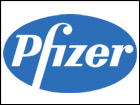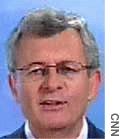|
Pfizer bucks pharma trend
|
 |
December 18, 2001: 4:35 p.m. ET
Drugmaker sees continued strong growth as sales of Lipitor soar.
|
NEW YORK (CNN/Money) - Pfizer Inc. said Tuesday annual sales of its best-selling drug Lipitor jumped 30 percent from 2000 and the company is looking to double its current earnings in five years.
Pfizer (PFE: up $0.31 to $40.64, Research, Estimates) outlined this year's performance for its top drugs for analysts in New York and said that it is looking to file 15 new drug applications by 2006, and that its patents are well-protected until the end of the decade.
"There were no major surprises and that actually is good news, given that the recent surprises for the sector have been of the wrong kind," said Girish Tyagi, drug analyst with ABN Amro.
For 2001 the company said it expects to have eight drugs with sales exceeding $1 billion, with total pharmaceutical revenues projected to be $26 billion.
Leading the charge is cholesterol-lowering agent Lipitor, the largest-selling drug ever, which is projected to have sales of $6.5 billion, up from $5 billion in 2000.
Hypertension treatment Norvasc is estimated to have sales of $3.6 billion, with arthritis drug Celebrex, co-branded with Pharmacia (PHA: down $0.01 to $42.79, Research, Estimates), is forecast to have sales of $2.2 billion.
Sales of anti-impotence drug Viagra are seen rising about 15 percent from 2000 to $1.5 billion, and sales of antidepressant Zoloft should rise about 10 percent from last year to $2.3 billion.
Rounding out the billion-dollar drugs are epilepsy drug Neurotin and antibiotic Zithromax.
Patent protection and pipeline the keys
After a week that saw Merck & Co. (MRK: up $1.33 to $58.50, Research, Estimates) and Bristol-Myers Squibb (BMY: up $1.04 to $51.19, Research, Estimates) warn about 2002 earnings, Pfizer on Monday said it sees at least 20 percent earnings growth in 2002 and at least 15 percent earnings growth for 2003-2004.
Pfizer Chairman and CEO Hank McKinnell told CNNfn his company expects to continue industry-leading earnings growth, which in turn should translate to a steady rise in the stock.
"At the rates we're growing, our earnings should be about twice this level five years from now," McKinnell said. "If the price-to-earnings ratio stays the same, you can do the math."
McKinnell said Pfizer's strategy has been based on internal development, which has put his company in a strong position.

|
|
Hank McKinnell
Pfizer Chairman and CEO | |
"We're investing almost $5 billion this year (for research and development) and we're forecasting almost $5.3 billion this year," he said. "Plus we look to products we can license and products we can co-develop with others, so our strategy is more working with others in partnerships rather than looking to acquire."
The company currently has 162 products in its R&D pipeline, with 15 new drug applications expected to be filed by 2006. Of those 15, McKinnell said eight or 10 have the potential to be blockbusters, with more than $1 billion in annual sales.
"The company gave me confidence that they have next-generation products for markets that they currently participate in," ABN Amro's Tyagi said. "Additionally, for the large markets where they are not players, the company is developing compounds."
Among the most anticipated drugs, Pfizer said worldwide clinical trials for Spiriva, a treatment for chronic obstructive pulmonary disease (COPD) which Pfizer is marketing for privately held German company Boehringer Ingelheim, have shown it is "well-tolerated and highly effective in once-daily dosing by inhalation, and provides sustained symptomatic improvements in shortness of breath."
The company also said it expects studies of the much anticipated inhaled version of insulin, Exubera, to be completed at the end of 2002, with a new drug application filed soon after that.
A new drug application for Darifenacin, a treatment for overactive bladder, is expected to be filed in 2002.
Along with a strong pipeline, Pfizer said it is confident, at least for a while, it will avoid the patent expiration problems that have plagued Merck and Bristol-Myers.
"We are well patent-protected towards the end of this decade," McKinnell told CNNfn.
He said Lipitor, for example, is patent protected until 2011 and Pfizer expects new indications for usage and new dosages should extend exclusivity on major drugs. 
|
|
|
|
|
|

|

